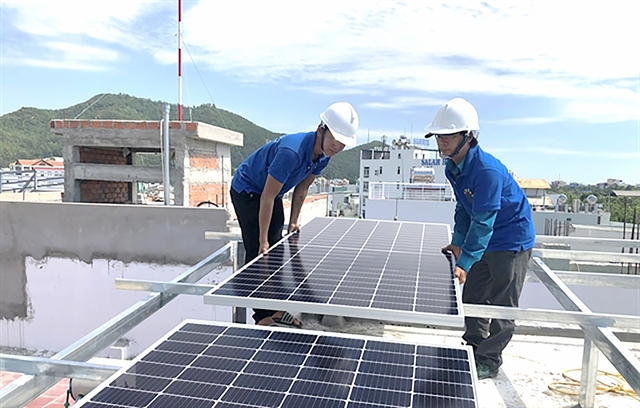 Economy
Economy

Green bonds are an innovative tool to mobilise financing from the private sector to scale up and achieve national climate plans, said Vũ Chí Dũng, director of the International Co-operation Department of the State Securities Commission (SSC).

|
| Installing solar rooftop for a household in the central province of Bình Định's Quy Nhơn City. Green bonds are meant to raising private sector finance for projects with environmental and social benefits, supporting the Sustainable Development Goals. — VNA/VNS Photo Nguyên Linh |
HÀ NỘI — Green bonds are an innovative tool to mobilise financing from the private sector to scale up and achieve national climate plans, said Vũ Chí Dũng, director of the International Co-operation Department of the State Securities Commission (SSC).
He made the statement at the launch of the Handbook 'How-to Issue Guide for Green Bonds, Social Bonds and Sustainability Bonds', held by the State Securities Commission (SSC) early this week.
“Green, social, and sustainability bonds are meant to raise private sector finance for projects with environmental and social benefits, supporting the Sustainable Development Goals,” said Dũng.
The growth of the labelled bond market, and green bonds in particular, has attracted a diverse and more mainstream investor base, he said
The institutional investor community such as pension fund managers, asset managers and those with large portfolios, including those with sustainability-related mandates, were increasingly seeking green and low-carbon investment opportunities, he said.
The handbook, made in collaboration with the International Finance Corporation (IFC), the Climate Bonds Initiative (CBI) and the Swiss State Secretariat for Economic Affairs (SECO), provides corporate issuers, and other market players, guidance in applying the global and ASEAN standards as well as national regulations of green, social and sustainability bonds which can help mobilise resources for socio-environmental friendly and sustainable projects.
At the launching event of the handbook, Phạm Hồng Sơn, SSC Deputy Chairman said: “This handbook will support the market players to understand the international and regional practices in issuing green, social and sustainability bonds, managing the proceeds from those bonds as well as to following the related environmental and social impact reporting.
“The SSC considers the development of such labelled bond products as a key factor contributing to the sustainable development of Việt Nam’s capital market."
“The IFC has been pioneering in a number of green bond transactions in the region and looking for opportunities in Việt Nam’s promising green bond market,” said Kyle Kelhofer, IFC Country Manager for Việt Nam, Cambodia and Laos.
“We believe that green bonds will be an effective vehicle for mobilising long-term funding for sustainable infrastructure and renewable energy projects, which the traditional lending products might not be able to afford. This will help expand funding for Việt Nam’s green and sustainable economic growth,” he said.
“When issuing green bonds, businesses face higher issuing costs compared to conventional bonds, more complex regulations on the use of capital raised, such as how much will be invested in the environment, how much will be invested in corporate governance and production and business activities,” Vũ Chí Dũng told Việt Nam News.
“Therefore, the yield rates of green bond are often lower than conventional bonds. However, businesses need to realise that profit is not the top target when issuing green bonds, they should also regard environmental responsibility and social responsibility.
“Of the mobilised capital, the rate of capital used to invest in the environment will decide whether this is a green bond or not, and there should be an intermediary to determine this rate, ensuring transparency and clarity,” he said.
The IFC Emerging Market Green Bonds Report 2019 indicated emerging market green bond issuances in 2019 hit US$52 billion, a 21 per cent increase from 2018, bringing outstanding bonds to $168 billion.
Even amid a global pandemic, the demand for green, social and sustainability bonds continues to soar. In its report in early 2021, Moody's expected issuance to reach another new record $650 billion in 2021, a 32 per cent increase over last year. This total will be comprised of approximately $375 billion of green bonds, $150 billion of social bonds and $125 billion of sustainability bonds.
As a member of the ASEAN Capital Markets Forum (ACMF), the SSC has been active in promoting the ASEAN Green Bond Standards (AGBS), ASEAN Social Bond Standards (ASBS), and ASEAN Sustainability Bond Standards (ASUS), based on the International Capital Market Association (ICMA)’s Green Bond Principles, Social Bond Principles, and Sustainability Bond Guidelines, to create a sustainable asset class in Việt Nam.
Following this launch, a training programme on how to issue labelled bonds including learning sessions, case studies, interactive discussions and exercises will be conducted in both Hà Nội and HCM City. — VNS




